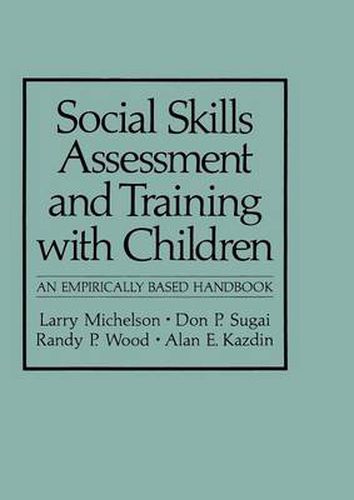Readings Newsletter
Become a Readings Member to make your shopping experience even easier.
Sign in or sign up for free!
You’re not far away from qualifying for FREE standard shipping within Australia
You’ve qualified for FREE standard shipping within Australia
The cart is loading…






This title is printed to order. This book may have been self-published. If so, we cannot guarantee the quality of the content. In the main most books will have gone through the editing process however some may not. We therefore suggest that you be aware of this before ordering this book. If in doubt check either the author or publisher’s details as we are unable to accept any returns unless they are faulty. Please contact us if you have any questions.
The purpose of this book is to provide readers with sufficient knowledge regard ing social skills assessment and training with children so that they can imple ment and evaluate social skills programs on their own. Increased interest in promoting children’s social skills has stemmed in part from advances in research that have shown the importance of childhood social competency for adjustment in both childhood and adulthood. There is a growing need for assessment and training methods that can be utilized by diverse groups of professionals and paraprofessionals. This book is intended for mental health workers, teachers, educators, clinicians, and child-care personnel. The book thoroughly reviews the literature to acquaint readers with relevant findings on social skills and to pro vide discussion regarding contemporary issues and assessment techniques. Sub sequently, comprehensive procedures in the training of children’s social skills are presented. Readers are also provided with 16 detailed training modules, each of which comprises a rationale, instructions, Scripts, and homework assign ments. These modules are designed to permit effective implementation of social skills training programs. Moreover, they provide a structured and program matically designed format that builds in clinical flexibility for their use with individual children or groups of children. These modules are followed by a clinical-issues section designed to address potential obstacles to effective training. Following these major sections, two appendixes have been included in the book. The first appendix is a step-by-step description of how to conduct an assessment.
$9.00 standard shipping within Australia
FREE standard shipping within Australia for orders over $100.00
Express & International shipping calculated at checkout
This title is printed to order. This book may have been self-published. If so, we cannot guarantee the quality of the content. In the main most books will have gone through the editing process however some may not. We therefore suggest that you be aware of this before ordering this book. If in doubt check either the author or publisher’s details as we are unable to accept any returns unless they are faulty. Please contact us if you have any questions.
The purpose of this book is to provide readers with sufficient knowledge regard ing social skills assessment and training with children so that they can imple ment and evaluate social skills programs on their own. Increased interest in promoting children’s social skills has stemmed in part from advances in research that have shown the importance of childhood social competency for adjustment in both childhood and adulthood. There is a growing need for assessment and training methods that can be utilized by diverse groups of professionals and paraprofessionals. This book is intended for mental health workers, teachers, educators, clinicians, and child-care personnel. The book thoroughly reviews the literature to acquaint readers with relevant findings on social skills and to pro vide discussion regarding contemporary issues and assessment techniques. Sub sequently, comprehensive procedures in the training of children’s social skills are presented. Readers are also provided with 16 detailed training modules, each of which comprises a rationale, instructions, Scripts, and homework assign ments. These modules are designed to permit effective implementation of social skills training programs. Moreover, they provide a structured and program matically designed format that builds in clinical flexibility for their use with individual children or groups of children. These modules are followed by a clinical-issues section designed to address potential obstacles to effective training. Following these major sections, two appendixes have been included in the book. The first appendix is a step-by-step description of how to conduct an assessment.